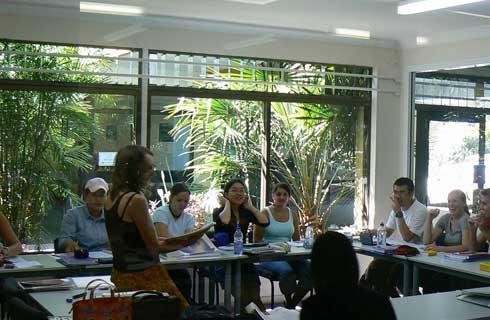地理空间科学硕士
Master of Geospatial Science

学历文凭
Masters Degree (Coursework)

专业院系
STEM College

开学时间

课程时长

课程学费

国际学生入学条件
You must have:
An Australian bachelor degree in any discipline, or equivalent.
OR
You may also be considered if you have at least ten years’ of work experience in geospatial science, geometrics, land information, surveying, geography, environmental science, geology, earth science, or environmental engineering.
To study this program you will need to complete one of the following English proficiency tests:
IELTS (Academic): minimum overall band of 6.5 (with no individual band below 6.0)
TOEFL (Internet Based Test - IBT): minimum overall score of 79 (with minimum of 13 in Reading, 12 in Listening, 18 in Speaking and 21 in Writing)
Pearson Test of English (Academic) (PTE (A)): minimum score of 58 (with no communication band less than 50)
Cambridge English: Advanced (CAE): minimum of 176 with no less than 169 in any component.
IDP—雅思考试联合主办方

雅思考试总分
6.5
- 雅思总分:6.5
- 托福网考总分:79
- 托福笔试总分:160
- 其他语言考试:Pearson Test of English (Academic) (PTE (A)): minimum score of 58 (with no communication band less than 50)
CRICOS代码: 092796G
申请截止日期: 请与IDP联系 以获取详细信息。
课程简介
A Master of Geospatial Science will prepare you for leadership roles in this field, building your understanding of spatial analytics and big spatial data for making critical decisions about our built and natural environment. You'll gain professional-level expertise in the analysis, management, capture and visualisation of spatial information, and become proficient in the latest technologies and infrastructures to support these skills.Through this course you will develop a unique breadth of expertise across geospatial science, including:knowledge of fundamental spatial information technologies, such as geographic information systems (GIS), geospatial programming, spatial databases, and cloud and mobile geospatial computingadvanced skills in mapping and visualisation for creating engaging and interactive geospatial presentationsknowledge of the latest spatial data capture systems, including satellite remote sensing, GPS satellite positioning, drone and aerial imagery, wearable sensors, sensor networks, and crowdsourced dataspecialised knowledge in key areas that complement geospatial science, and tailored to your specific needs, which may include environmental science, natural resource management, computer science, business and project management, architecture and urban planning, mathematics or statistics.
相关申请
 预科
预科 奖学金
奖学金 实习机会
实习机会 在校学习
在校学习 跨境学习
跨境学习 校园授课-线上开始
校园授课-线上开始 在线/远程学习
在线/远程学习
开学时间&学费
学费信息仅供参考,请与IDP联系以获取详细信息
| 开学时间 | 时长 | 学费 | 地点 |
|---|
学校排名

世界排名401
数据源:
泰晤士高等教育世界大学排名
关于皇家墨尔本理工大学

皇家墨尔本理工大学 (RMIT) 是一所全球性的科技、设计和创业大学。它是世界前 150 名大学之一(QS 2026 年大学排名),以其在高等教育和应用研究领域的全球卓越成就而闻名。RMIT 的校园配备了世界最先进的技术和设施,为开展突破性研究提供所需的工具和专业知识。该大学是澳大利亚最大的大学之一,始建于1887年。它也是澳大利亚唯一一所可以使用''皇家''前缀的高等教育机构,曾获得伊丽莎白二世女王的赞助。该大学的主校区位于墨尔本市中心,墨尔本是全球第五大最佳学生城市(QS 2026年最佳学生城市)。RMIT在澳大利亚拥有三个校区和两个航空基地,在越南拥有两个校区,并在巴塞罗那设有一个产学研合作中心。该大学还与全球40多个国家的200所不同机构建立了合作伙伴关系。RMIT在全球排名第125位 (QS2026年排名),在减少不平等方面的努力方面位列全球第五位 ((2025年泰晤士高等教育影响力排名)。RMIT欢迎来自世界各地的学生,并为希望在大学学习并获得学位的学生提供广泛的交换项目。该大学专注于应用型学习,包括实践学习和行业学习。该大学与德勤、阿迪达斯和宝马等全球知名品牌合作,提供旨在确保学生毕业后做好充分准备,开启精彩职业生涯的课程。许多课程提供实习机会和实践体验。
本校相关课程

媒体与传播学士(荣誉学位)
学历文凭
Bachelor Degree with Honours
开学日期
课程费用总额


工程学硕士(电气和电子工程)
学历文凭
Masters Degree (Coursework)
开学日期
课程费用总额


生物医学学士
学历文凭
Bachelor Degree
开学日期
课程费用总额


时装和纺织品销售副学士学位
学历文凭
Associate Degree
开学日期
课程费用总额


心理健康护理研究生文凭
学历文凭
Graduate Diploma
开学日期
课程费用总额


应用科学副学士
学历文凭
Associate Degree
开学日期
课程费用总额

其他相关课程

测量学文凭
 新南威尔士州立职业技术学院
新南威尔士州立职业技术学院学历文凭
Diploma
开学日期
课程费用总额


哲学硕士(测绘)
 科廷大学
科廷大学泰晤士高等教育世界大学排名:256
学历文凭
Masters Degree (Research)
开学日期
课程费用总额


哲学博士(调查)
 纽卡斯尔大学
纽卡斯尔大学学历文凭
Ph.D.
开学日期
课程费用总额


测量学学士
 科廷大学
科廷大学泰晤士高等教育世界大学排名:256
学历文凭
Bachelor Degree
开学日期
课程费用总额


哲学硕士(调查)
 纽卡斯尔大学
纽卡斯尔大学学历文凭
Masters Degree (Research)
开学日期
课程费用总额


哲学博士(空间科学)
 科廷大学
科廷大学泰晤士高等教育世界大学排名:256
学历文凭
Ph.D.
开学日期
课程费用总额










